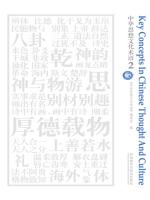书评
用户827614
After immersing myself in Chinese Ideological and Cultural Terms (Volume
2), I am struck by the book’s profound exploration of the rich tapestry
of Chinese thought, offering a window into the nation’s philosophical,
ethical, and cultural heritage. This volume serves as both an
educational resource and a cultural bridge, illuminating concepts deeply
rooted in Chinese civilization while fostering cross - cultural
understanding. One of the most captivating aspects of this book is its
detailed elucidation of traditional Chinese philosophical concepts.
Terms like “天人合一” (Harmony between Man and Nature) and “中庸” (the
Doctrine of the Mean) are not merely presented as abstract ideas but are
contextualized within historical, social, and philosophical frameworks.
The concept of “天人合一” challenges modern readers to reconsider humanity’s
relationship with the environment, highlighting the ancient Chinese
belief in the interconnectedness of all things. In an era facing
pressing environmental challenges, this timeless wisdom provides a fresh
perspective, reminding us of the importance of respecting nature rather
than seeking to dominate it. Similarly, “中庸” embodies the art of finding
balance and moderation in all aspects of life, from personal conduct to
governance. It offers a practical approach to decision - making and
conflict resolution, suggesting that extremes should be avoided in favor
of a harmonious middle ground.



 京公网安备 11010802032529号
京公网安备 11010802032529号